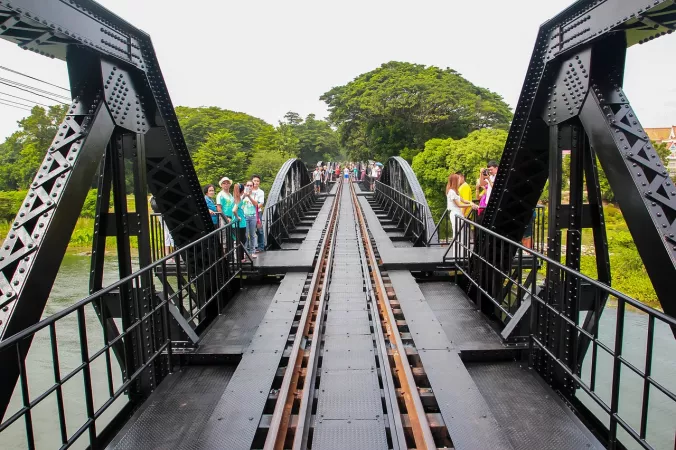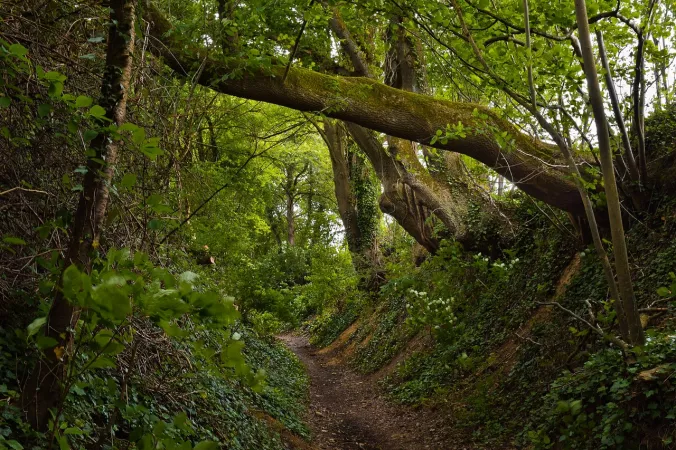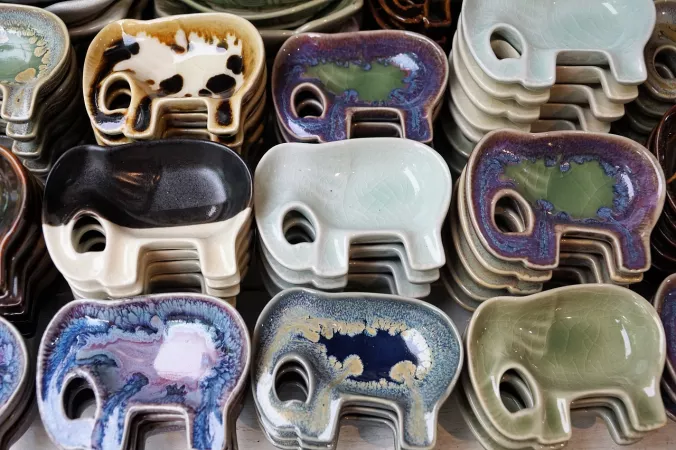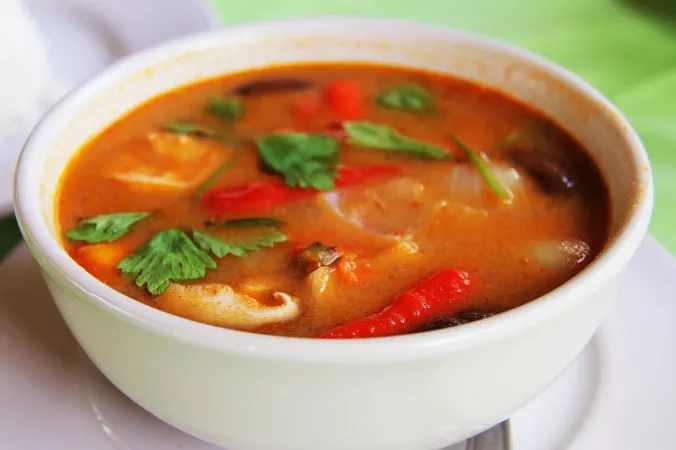
Pai Travel Guide
Pai, a picturesque town nestled in the mountains of northern Thailand, is a hidden gem known for its lush greenery, hot springs, and vibrant night market. With a rich history dating back to the Shan people and a unique blend of Thai and Burmese cultures, Pai offers a tranquil escape for travelers seeking a laid-back atmosphere.Top Attractions in Pai
- Explore the iconic Pai Canyon for breathtaking views of the surrounding landscapes.
- Visit the Pai Hot Springs for a relaxing soak in natural mineral-rich waters.
- Stroll through the vibrant Pai Night Market for local handicrafts and delicious street food.
- Discover the beauty of the World War II Memorial Bridge, a historic landmark in Pai.
- Experience the peaceful atmosphere of the Wat Phra That Mae Yen temple perched atop a hill.
Pai is Famous for
Known for its laid-back vibe and stunning natural scenery, Pai is famous for being a hippie haven and a popular destination for backpackers looking to unwind amidst nature.Top Attractions in Pai
- Explore the iconic Pai Canyon for breathtaking views of the surrounding landscapes.
- Visit the Pai Hot Springs for a relaxing soak in natural mineral-rich waters.
- Stroll through the vibrant Pai Night Market for local handicrafts and delicious street food.
- Discover the beauty of the World War II Memorial Bridge, a historic landmark in Pai.
- Experience the peaceful atmosphere of the Wat Phra That Mae Yen temple perched atop a hill.
What's Great about Travelling to Pai?
- Peaceful and serene atmosphere, perfect for relaxation
- Abundance of natural attractions for outdoor enthusiasts
- Vibrant local culture and markets to explore
- Opportunity to connect with like-minded travelers in a laid-back setting
What's Not So Great about Travelling to Pai?
- Limited public transportation options within the town
- May not be suitable for travelers seeking a bustling city experience
- Some areas can be crowded during peak tourist seasons
- Limited healthcare facilities in remote areas
Travel Tips for Pai
- Visa on arrival available for most nationalities, check requirements beforehand
- Renting a scooter is a popular way to explore Pai, but drive safely
- Respect local customs and traditions, especially when visiting temples
- Stay hydrated and use sunscreen due to the hot climate
Important Pai trip information
- Ideal Duration: 3-4 days to fully explore Pai and its surroundings
- Best Time to Visit: November to February for cool and pleasant weather
- Nearby Airports and Railway Stations: The closest airport is Chiang Mai International Airport, and Pai has no railway station
FAQ's on Pai
Q1: What is the best time to visit Pai?
The best time to visit Pai is during the cool season from November to February when the weather is pleasant with clear skies and cool temperatures. This is also the peak tourist season, so expect more crowds. Avoid the rainy season from June to October when heavy rainfall can lead to road closures and limited outdoor activities. March to May is hot but less crowded, making it a good time to explore the town and surrounding areas.
Q2: Do I need a visa to travel to Pai?
Most nationalities are granted a 30-day visa exemption upon arrival in Thailand when entering through an international airport. However, if arriving by land, the visa exemption is only 15 days. If you plan to stay longer, you may need to apply for a tourist visa in advance. Check the latest visa requirements with the Thai embassy or consulate in your country before traveling to Pai.
Q3: What are the must-visit attractions in Pai?
Pai offers a range of attractions, including the iconic Pai Canyon for stunning views, the relaxing Pai Hot Springs for a soak in natural mineral water, and the picturesque Land Split for a unique geological formation. Don't miss visiting the Pai Walking Street for local crafts and delicious street food, exploring the temples like Wat Phra That Mae Yen, and taking a dip in the Pai Bamboo Bridge. Nature lovers can also enjoy the beauty of the Pai River and the nearby waterfalls.
Q4: Is Pai a safe place to travel?
Pai is generally a safe destination for travelers. However, like any other place, it's important to be cautious of your surroundings and belongings, especially in crowded areas. While the crime rate is low, petty theft can occur, so keep your valuables secure. Avoid walking alone at night in dimly lit areas and always use licensed transportation services. Be mindful of road safety when renting a scooter and follow traffic rules. Overall, exercise normal precautions, and you should have a safe and enjoyable trip to Pai.
Q5: What is the local currency in Pai and can I use credit cards?
The local currency in Pai, as in the rest of Thailand, is the Thai Baht (THB). ATMs are widely available in Pai town, allowing you to withdraw cash easily. While credit cards are accepted in some hotels, restaurants, and larger shops, it's advisable to carry cash for smaller vendors and markets. Inform your bank of your travel plans to avoid any issues with card usage abroad. Money exchange services are also available in Pai town for currency conversion.
Q6: What is the local cuisine like in Pai?
Pai offers a diverse culinary scene with a mix of traditional Northern Thai dishes, international cuisines, and fusion foods. Try local specialties like Khao Soi (curry noodle soup), Sai Ua (spicy sausage), and Gaeng Hang Lay (Northern Thai curry). Vegetarians and vegans will find plenty of options, including fresh fruit smoothies, organic salads, and plant-based dishes. Visit the night market for a foodie adventure, sampling grilled skewers, pad Thai, and homemade desserts. Be open to trying new flavors and spices unique to Northern Thai cuisine, and don't forget to sip on refreshing Thai iced tea or coffee while in Pai.
Q7: What transportation options are available in Pai?
In Pai, you can get around town easily on foot or by renting a bicycle or scooter from numerous rental shops. Taxis and songthaews (shared pick-up trucks) are available for longer distances or traveling to nearby attractions. Private car hires and motorbike rentals are also common for exploring the countryside and remote areas. If you prefer public transport, mini-vans and buses operate between Pai and major cities like Chiang Mai. Keep in mind that road conditions can be challenging, especially during the rainy season, so drive carefully and wear a helmet when riding a scooter. Plan your transportation in advance to make the most of your time in Pai.
Q8: Are there any cultural norms or etiquette I should be aware of when visiting Pai?
When visiting Pai, it's important to respect the local customs and cultural norms of the predominantly Thai Lanna community. Dress modestly when visiting temples and religious sites, covering your shoulders and knees out of respect. Remove your shoes before entering homes, shops, and sacred places. Greet locals with a traditional "wai" gesture by placing your palms together in front of your chest and bowing slightly. Avoid public displays of affection and be mindful of your behavior in public spaces. Engage with the community in a polite and friendly manner, showing appreciation for the local traditions and way of life. By respecting the local culture, you'll have a more enriching and authentic experience in Pai.
Q9: I am a travel agent. How can I buy travel leads of Pai?
Register yourself as a travel agent at agents.tripclap.com and then you can buy travel leads to Pai once your account is approved. For more details contact our support team at +91-8069186564 or support@tripclap.com






